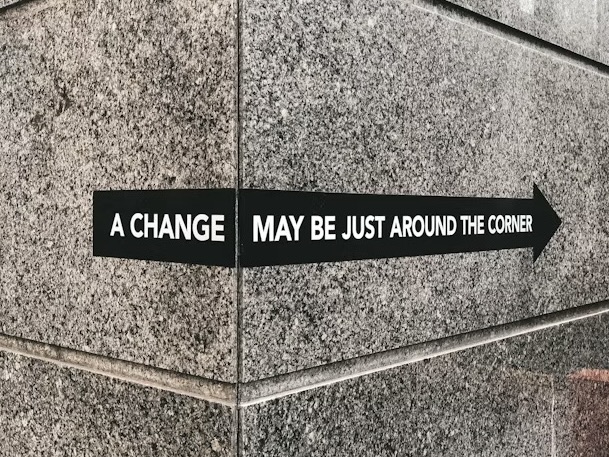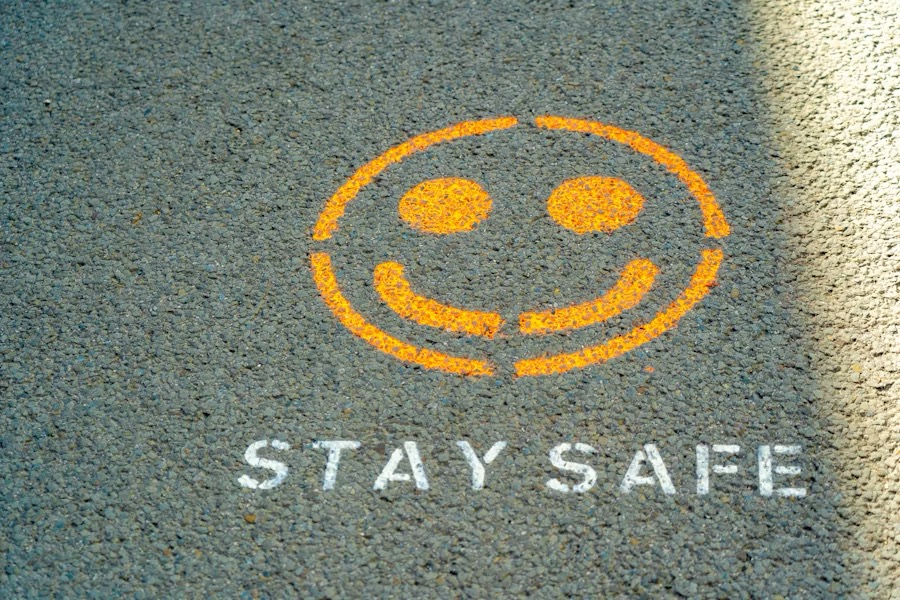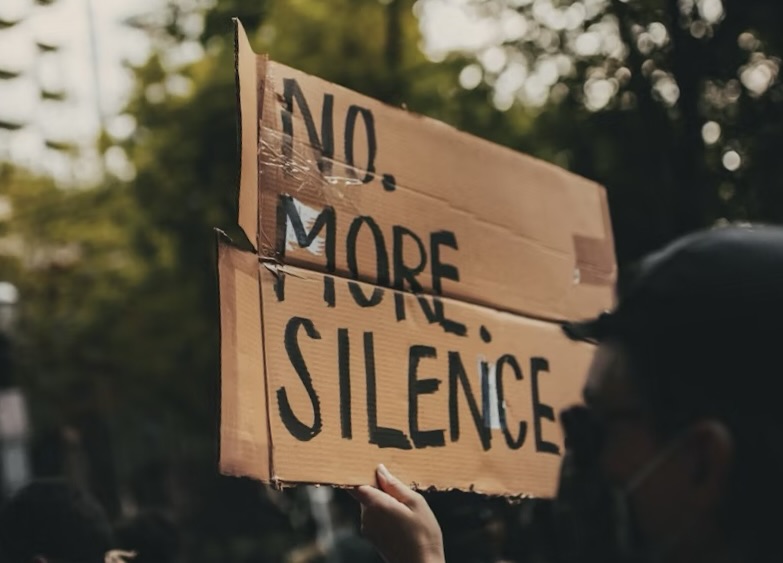Written By: Darryl W. Thomas, Jr.
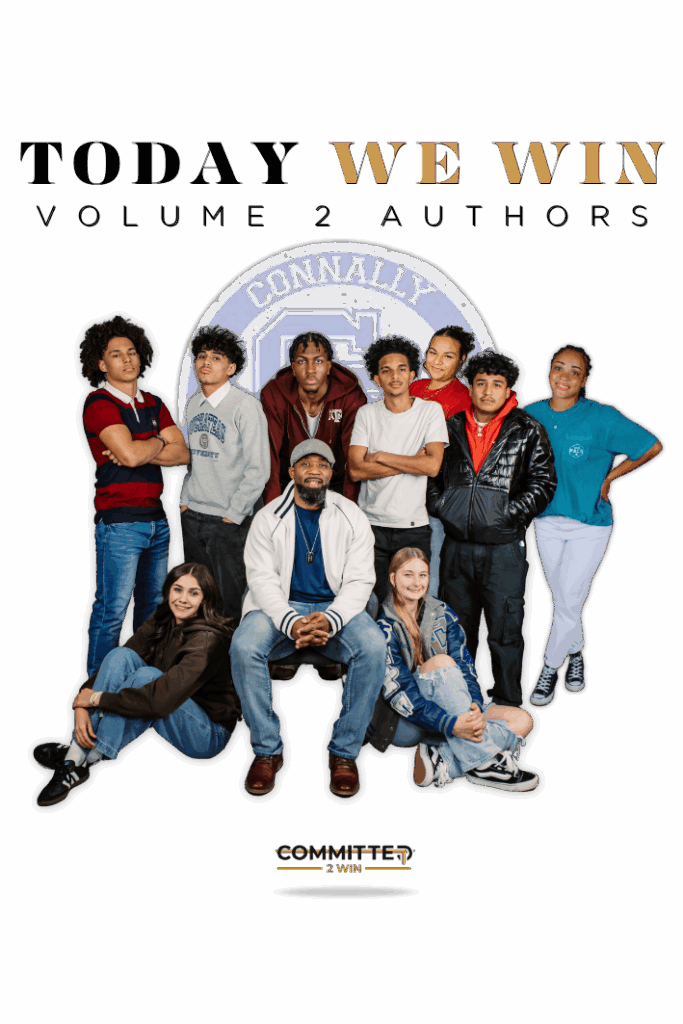
Shocking Realities
November is Men’s Mental Health Awareness Month, yet the crisis among men—especially those aged 16–24—remains largely unseen. Consider these statistics:In 2023, the suicide rate among males was nearly four times higher than that among females—about 22.8 deaths per 100,000 men compared to 5.9 for women.
- Suicide remains the second leading cause of death for young people ages 10–34 in the U.S.
- These are not just numbers—they reflect young men silently fighting battles with far too little support.
Everyday Wars: Military Deployment vs. Life at Home
As a U.S. Marine who served in Kuwait (2003) and Iraq (2004), I know what combat looks like. I faced enemies, exhaustion, fear, and the weight of being accountable for others’ lives.
But the wars don’t end when the uniform comes off. Young men today fight battles too—academic pressures, racial bias, job expectations, relationship demands, identity crises—equally real, equally destructive if unaddressed.
In both war zones, mental and emotional well-being must be prioritized. What you see, you can’t unsee. The trauma isn’t always visible—but it lingers.
Why Young Men Need Help Now
Young men (16–24) often carry silent burdens:
- The demand to “be strong” suppresses vulnerability.
- School, extracurriculars, work, family—all in a balancing act.
- Social media and cultural expectations add fuel to the fire of anxiety.If left unchecked, this stress becomes trauma, and trauma can lead to despair.
Three Practical, Proven Tips to Improve Mental Health
- 1. Encourage Open, Honest Conversation to Create environments where young men can speak without judgment. A simple question like “How are you really doing?” can break the silence. Chat with a peer, coach, or mentor. The most potent antidote to isolation is connection.
- 2. Build a Routine Anchored in Movement and PurposeExercise reduces anxiety and builds resilience. Commitment to physical movement—whether lifting, running, or team sports—signals you’re worth the effort. Add a simple daily goal or habit you stick to. The structure will give your mind something to hold onto.
- 3. Teach Self-Awareness and RegulationHelp young men recognize triggers: fatigue, stress, unmanaged expectations. When they identify what pushes them off balance, they regain control. Couple that with a mental reset: meditation, journaling, prayer. Awareness leads to action.
Why Our Mission Matters: Hope for the Underdogs
Many youth we serve are emotionally imprisoned, not just physically. They’ve experienced trauma—neglect, abuse, systemic obstacles. Too often they lack the tools to process it.Our initiative—Hope for the Underdogs—uses leadership development and literacy programs (including our books TODAY… I WIN and TODAY WE WIN Volumes 1 & 2) to equip these young men with confidence, voice, and a pathway out of silence.Your support helps break the cycle. You help transform young men from wounded warriors into healthy leaders.Call to ActionSupport our work by sponsoring a young man’s participation in Hope for the Underdogs. Visit: https://www.committed2win.com/hopefortheunderdogs
Mark your calendar for the 2025 KING ME Conference, December 12–13 in Waco, TX—dedicated to young men’s leadership and mental wellness. For more info: [email protected]
Share this article. Talk about it. Ask the young men in your life: “How are you doing?” Your concern could launch a conversation that saves a life.
About Darryl W. Thomas, Jr.Darryl W. Thomas, Jr. is a U.S. Marine veteran (Kuwait 2003, Iraq 2004), leadership expert, award-winning speaker, holds a master’s in Educational Leadership and five-time bestselling author. Married 24 years to his high-school sweetheart and father to five children—ranging from a Marine to a TCU graduate—Darryl leads Committed 2 Win. He has dedicated more than two decades to empowering young men, advocating for mental health, and restoring community legacies.
📧 Contact Us: [email protected] | (254) 405-7245🌐 http://www.committed2win.com📺 YouTube Live Tuesdays @ 8:15 PM CST – @1DarrylWThomasLet’s normalize the conversation. Let’s empower young men and men alike to not just survive, but to thrive. Freedom from the internal war starts with awareness—and it starts with you.
References1 Suicide – National Institute of Mental Health (NIMH). Retrieved from https://www.nimh.nih.gov/health/statistics/suicide2 NCHS Data Brief No. 509 September 2024 – CDC. Retrieved from https://www.cdc.gov/nchs/data/databriefs/db509.pdf
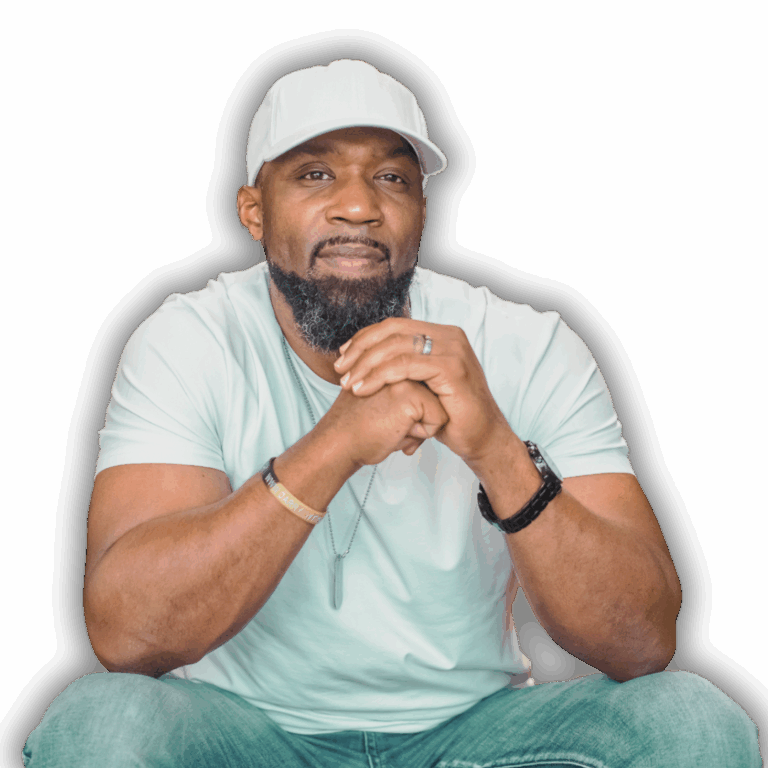
Darryl W. Thomas, Jr. is a U.S. Marine, leadership development expert, award-winning speaker, five-time bestselling author, and at-risk interventionist with over two decades of experience. He is the CEO of Committed 2 Win, a personal and leadership development community focused on inspiring, challenging, and empowering young people and adults to overcome adversity and take ownership in becoming the best version of themselves.Beyond his professional achievements, Darryl is a devoted family man, married to his high school sweetheart for 24 years and father to five children: a U.S. Marine, a TCU graduate, a University High School graduate, and two University High scholar-athletes.Let’s continue this conversation and ensure that every student knows they are not alone on their journey.Follow Darryl at LinkedIn, X and YouTube.
This week is OCD Awareness Week.
OCD Awareness Week is a worldwide event that serves to dispel myths about obsessive compulsive disorder, break the stigma around mental illness, provide education about the disorder, and share how to support those affected. There are over 200 million people worldwide living with OCD, and public misconception can prevent them from accessing timely and effective treatment needed to advance from suffering to thriving. This week, whether you share facts, tell your own story, or otherwise support OCD Awareness Week, you are making a powerful difference.

I was officially diagnosed with OCD at 21, meaning I lived a long time not understanding what my brain was doing to itself. Obsessive Compulsive Disorder is also called the doubting disorder. It not only makes you doubt yourself and all aspects of your life, but, most of the thoughts that come with OCD are entirely illogical, which makes you doubt others, including those you love and trust most, and your basic understanding of reality.
Obsessions are unwanted, intrusive thoughts, images, or urges that trigger intensely distressing feelings. Compulsions are behaviors an individual engages in to attempt to get rid of the obsessions and/or decrease distress. Together, they create harmful cycles of thinking and patterns of behavior. There is a public misconception that OCD is just a minor personality quirk or preference and that everyone is “a little bit OCD.” In reality, OCD is a serious and often debilitating mental health disorder that affects people of all ages and walks of life.
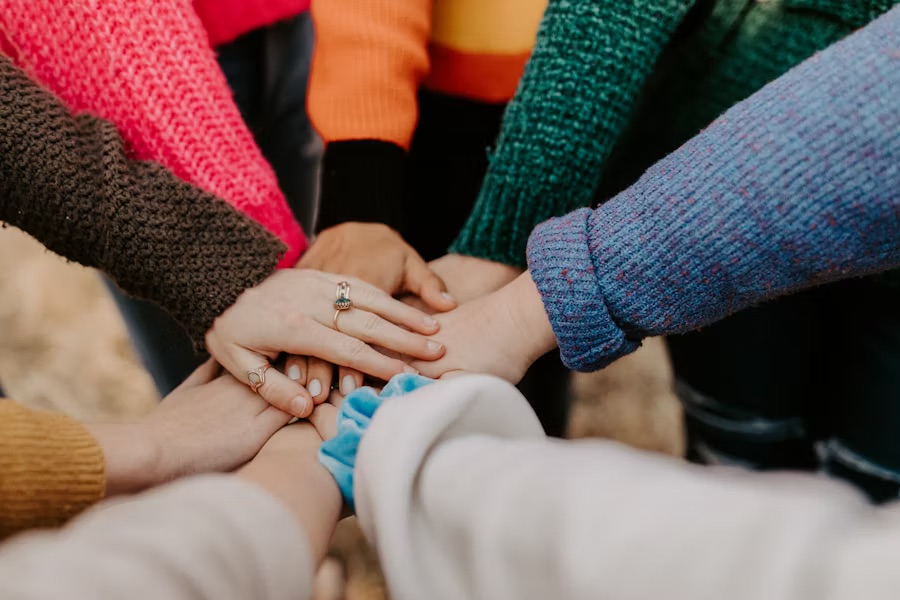
One of the unintended consequences of mental health education and advocacy amidst a time of social media is the watering down of clinical terminology. Many people can experience obsessive thoughts and/or compulsive behaviors at some point in their lives, but that does not mean that we “all have some OCD.” In order for a diagnosis of OCD to be made, this cycle of obsessions and compulsions must be so extreme that it consumes a lot of time, causes intense distress, or gets in the way of important activities that the person values.
Again, not all behaviors associated with OCD are indicative of a mental disorder, and a comprehensive evaluation from a qualified mental health professional is highly encouraged before self diagnosing. Obviously, I passed my tests with flying colors; no studying needed. I was in talk therapy, working out my thought processes with a mental health professional when she simply suggested the idea. The recognition and affirmation shocked my system. I was connected with a psychiatrist who gave me a lot more information on the specific diagnosis, connecting me with OCD specific resources. Going to therapy with OCD has been described as being in a boxing ring with an imaginary opponent, and I can attest to that. A lot of it is straight up exposure therapy or forcing yourself out of thoughts and behaviors that have been crafted for a sense of safety.
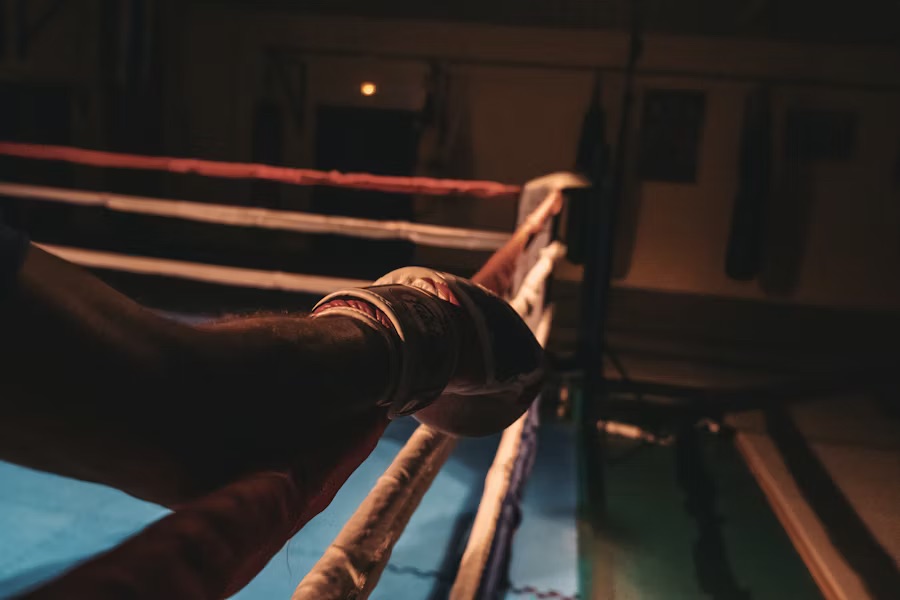
This week, I challenge you to share your story, listen to the stories of those living with OCD, share findings on the reality of it, and challenge myths and misinformation you see regarding this diagnosis.

Elizabeth Riley hails from Tennessee and is a graduate of English Literature and Professional Writing & Rhetoric from Baylor University. With passions in archival preservation, communal connection, and women in sports, she writes because it matters, with hopes of bridging villages and fostering revelry amongst them.
If you or someone you know is struggling or in crisis, help is available. Call or text 988 or chat 988lifeline.org to reach the 988 Suicide & Crisis Lifeline.

September is upon us, and our duty this Suicide Awareness Month is to start conversations regarding mental health, spread hope to those in need, and spark meaningful action around one of the most urgent crises of our time. World Suicide Prevention Day is Wednesday, September 10th, but all month long, mental health advocates, prevention organizations, survivors, and allied community members are uniting to promote suicide prevention.
Suicide affects millions of people every year, yet too many struggle in silence. It starts with one conversation: ask someone how they’re doing and be ready to truly listen. No one has to face their battles alone. Whether you’re facing challenges, hoping to support a friend or loved one, or looking to help, your voice matters.

Here in Texas, there are three branches of the American Foundation for Suicide Prevention. AFSP of Central Texas is hosting an Out of the Darkness fundraiser walk in Waco on September 27, 2025. With over 350 participants already joined, this walk at Brazos Park East is the perfect way to participate in the community in a way that matters.
Help exists, and healing is possible. Inform yourself of warning signs for suicide, encourage open conversations about mental health, and connect people to proven treatments and resources.


Elizabeth Riley hails from Tennessee and is a graduate of English Literature and Professional Writing & Rhetoric from Baylor University. With passions in archival preservation, communal connection, and women in sports, she writes because it matters, with hopes of bridging villages and fostering revelry amongst them.
Breaking the Emotional Chains that Bind Us
BY: Darryl W. Thomas, Jr.

When we celebrate Independence Day, we pledge pledging allegiance under a banner that declares our freedom. Yet, for countless Americans, freedom is merely surface-deep. Emotionally and psychologically, they remain imprisoned — not by walls or guards, but by trauma that echoes in their minds.
According to the National Center for PTSD, a staggering 70% of U.S. adults experience at least one traumatic event in their lifetimes, and up to 20% — over 44 million people — will develop PTSD symptoms. These aren’t just numbers — they reflect deeply lived struggles that shackle hearts long after the event.
The Hidden Chain of Trauma
Freedom is never free — not from the battlefield, prison bars, or personal loss. As a U.S. Marine who served in Kuwait (2003) and Iraq (2004), I experienced the chaos of combat firsthand. In war, you see the enemy. In life, trauma can be invisible, internal, and infinitely more destructive.
I, too, carry these scars — not just from war, but from my youth. A string of betrayal, neglect, and emotional distress left its mark. I learned that true freedom is not cheap, and it comes at a hefty price. This is especially true when it comes to trauma, anxiety, wounds, and guilt.
The 11-Figure Price Tag
Freedom demands one thing: F-O-R-G-I-V-E-N-E-S-S. This 11-figure price tag requires courage, vulnerability, and grace. Many people are not willing to pay such a price but it’s the essential currency that buys freedom.
When it comes to forgiveness, there are five strategies to consider:
1. Forgive Others- Holding onto anger or pain only strengthens the chains. Release those who hurt you.
2. Forgive Yourself- Guilt is a cruel jailer. Recognize that you did the best you could. Choose grace over shame.
3. Seek Support- Therapy, prayer, or mentorship isn’t a sign of weakness — it’s courage in motion. Freedom often needs someone beside you.
4. Narrative Liberation-Tell your story — whether to a trusted ally or through journaling. Reclaim the narrative from the eyes of trauma.
5. Serve Someone- Else Helping another person reveals your resilience and reclaims your power. Gratitude and purpose heal the heart.
Chains Upon Chains: Youth Behind Bars
The most heartbreaking prisons are emotional and invisible. In Texas, juvenile offenders are often chained emotionally by trauma. Between 75–93% of incarcerated youth have experienced at least one traumatic event, compared to just 34% of their peers. Many arrive emotionally wounded and leave further scarred.
That’s why Hope for the Underdogs isn’t just a summer initiative based on literacy — it’s a freedom movement. By equipping these young men and women with stories of triumph (TODAY… I WIN, TODAY WE WIN Volumes 1 & 2), we’re planting seeds of liberation. We’re offering them a path to forgive, heal, and break the chains that bound them.
You Can Join the Freedom MissionFreedom from trauma isn’t an abstract ideal — it starts in our communities. Here are four ways you can join the mission:
- Sponsor a Youth: Your support provides books and mentorship, forging pathways to healing.
- Share the Word: Spread our mission through your network. With awareness, we dismantle stigma.
- Partner with Hope: Host workshops, donate resources, or volunteer time.Invite Dialogue:
- Talk about trauma and forgiveness at church, school, or community events.
Final Call: Freedom Is Waiting
Freedom isn’t a moment — it’s a journey that reads: “To those who hurt me…but most, to the parts of myself I blamed.” By forgiving others and ourselves, we dismantle emotional prisons and allow our souls to breathe.To the parents, pastors, educators, and patriots reading this — I challenge you: will you pay the price of freedom? Let forgiveness — spiritual, emotional, personal — buy your liberation.Help our children feel freedom’s promise this summer through Hope for the Underdogs. Your sponsorship and voice can help set a generation free — literally, emotionally, spiritually.
This July, let’s not only celebrate freedom — let’s live it. Forgive, heal, and combat emotional imprisonment — for your family, your community, and the undamaged hearts waiting for us at Hope for the Underdogs.
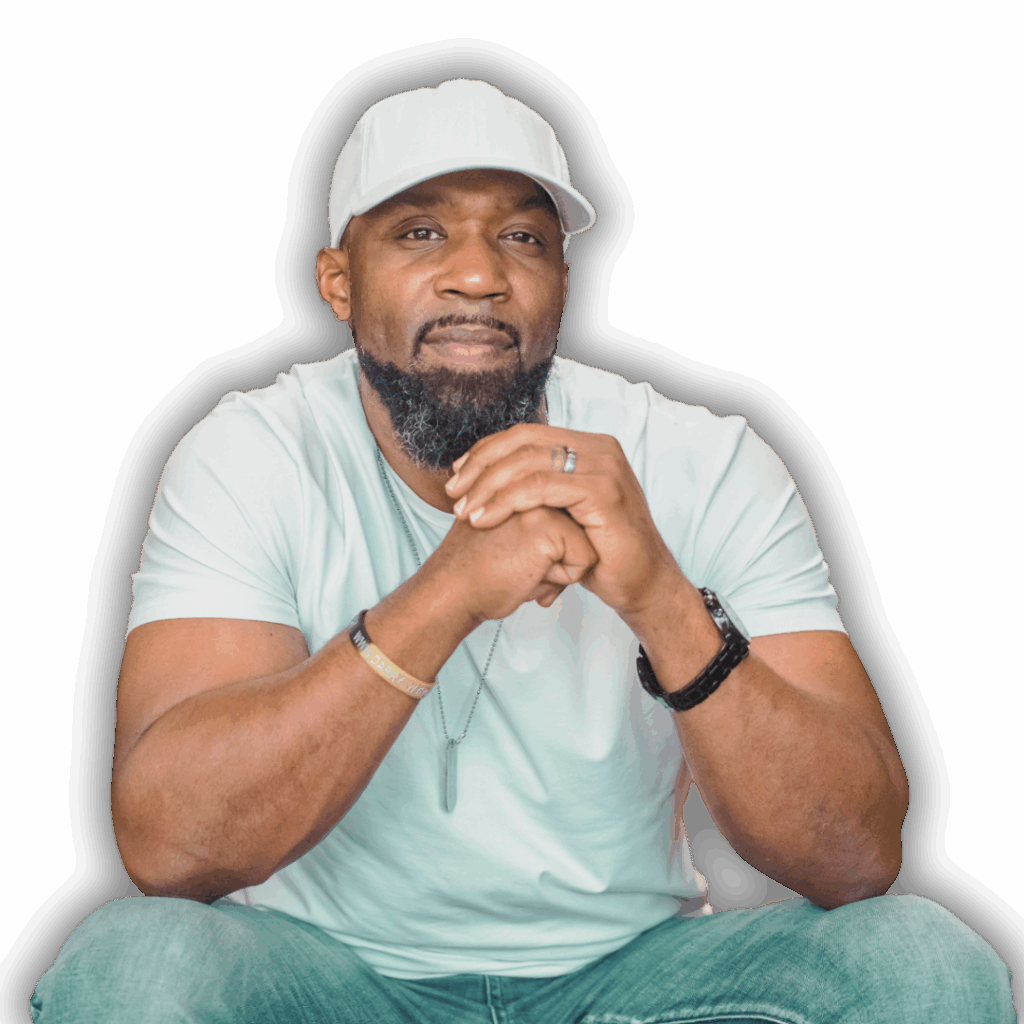
Darryl W. Thomas, Jr. is a U.S. Marine veteran (Kuwait, 2003; Iraq, 2004), leadership expert, award-winning speaker, and five-time bestselling author. A devoted family man—married 24 years, father of five, and founder of Committed 2 Win—he’s spent over 20 years helping individuals heal, lead with integrity, and break cycles of trauma.Connect with Darryl📧[email protected]🌐 www.committed2win.com/hopefortheunderdogs 📺 YouTube Live Tuesdays @6 pm CST: @1DarrylWThomas
By Darryl W. Thomas, Jr.
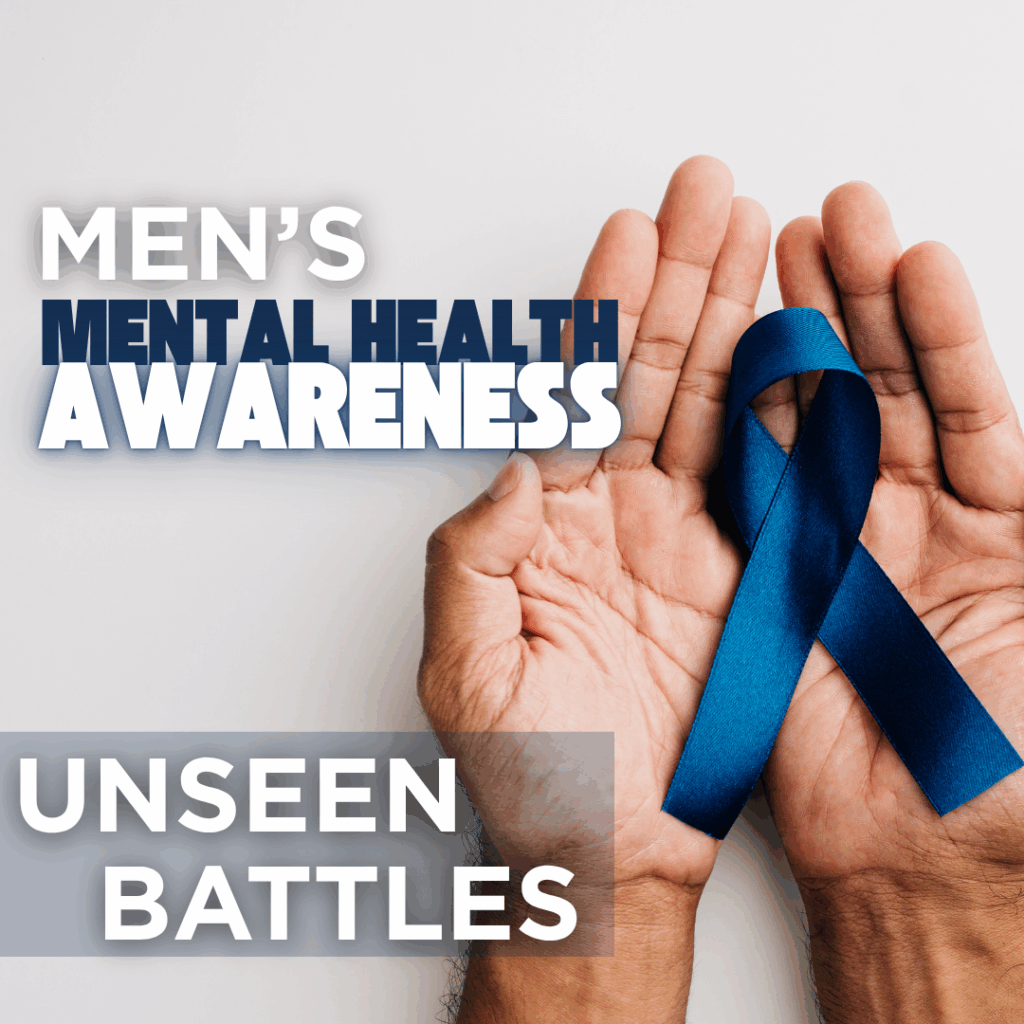
A Battle Worn Long After the War
What if I told you that men are five times more likely than women to apply a permanent solution to a temporary problem? Would that shock you? Afterall, we as men like to get the job done, right? Well in this case it is sad but true… yet wrong.
More than 49,000 Americans died by suicide in 2022, and males accounted for nearly 80% of those deaths — nearly five times higher than women — highlighting a silent crisis among men, especially fathers and husbands.
For family men, this pressing reality is a reminder: the battles fought on the home front are as real and field-tested as those in overseas combat.
Comparing Wars: The Marine and the Dad
Having served our country from 2000 to 2005; I was one of many called into wartime situations. As a U.S. Marine, I spent time in Kuwait in 2003 and Iraq in 2004. One prominent lesson that I learned is that battle fatigue isn’t left on the battlefield. PTSD, a brutal companion in wartime, finds its way home. Making the internal battles more complex and difficult to conquer.
A year after leaving the Corps, my wife began to show signs of a debilitating, incurable, and hereditary disorder as she was pregnant with our third child. To say that it was challenging is a gross understatement. So, my load was comprised of dealing with PTSD coupled with trying to stay present for a sick spouse, maintaining emotional availability for three children – ultimately five, operating a business, working a 9-5 job and serving the community.
I discovered that I was not the only man dealing with such heaviness. I also learned that, in combat, the enemy is visible. At home, the enemy often hides in exhaustion, emotional silence, guilt, and the heavy expectation to carry all burdens alone.
As a family, your peace is vital. In light of June being the month that we celebrate fathers and Men’s Mental Health Awareness month, I implore all fathers to consider the following.
Three Ways Fathers Can Protect Their Peace
- Battle Begins with Boundaries- Protect your non-negotiable time for family dinners, prayer, and exercise like you would mission-critical operations. Leave work at work. Be where your feet are. Oftentimes, your presence is more important than your provision. It’s here that mental and spiritual strength are safeguarded.
- Deploy Your Support Network- In the Corps, every Marine has a battle buddy. At home, you can create a similar system — regular check-ins with another father, a mentor, or a counselor help fight isolation and toxic stoicism. Don’t be that lone wolf because a lone wolf will starve.
- Own Your Emotional Scars- PTSD and anxiety don’t look a certain way. I don’t care how well you try to dress it up, it will reveal itself. When untreated it can cause collateral damage. Success at work cannot mask the emotional scars. Your community involvement cannot conceal unhealed wounds.
Courageously admitting that there are issues begins the path to healing. Again, don’t face them alone. Taking that first step is an act of courage that models strength for your family.
Three Additional Strategies to Secure the Home Front
- Routine Physical Readiness:Complete at least three workouts per week — whether it’s a brisk walk around the neighborhood, a ruck march, a lifting session in the garage or weight-training at the gym. Implement a routine of bodily exercise to regulate stress, release endorphins, and maintain clarity.
- Spiritual Resupply:Engage in weekly (if possible, daily) spiritual practices — Bible study, meditation, or prayer walks — to replenish the inner well from which you lead. This strategy is a gamechanger.
- Intentional Debriefing:Schedule a monthly “T-time discussion” with your spouse. The more frequent the discussion, the better. What is T-time? It is short for truth time. This is a moment to discuss wins, struggles, and emotional needs honestly without judgement. It invites connection and clarifies purpose.
Closing Words to the Warriors at HomeMen, the uniform may come off, but your battles don’t. Strength is not measured by how much you can carry — it’s proven by how bravely you choose healing. Your legacy isn’t built in silence but in the courage to open up, rest, and invite support.
Mission Orders Start Today: Choose one tip and commit. Join the Brotherhood: Be in the house—virtually—this Tuesday at 6 pm CST on YouTube Live (@1DarrylWThomas) for my REAL Talk Tuesday session. Let’s stand together and talk real. https://www.youtube.com/@1darrylwthomas/streams Engage Back: Comment on what tactic you’re using to guard your mental health or share a story that inspires.And please think about supporting our Hope for the Underdogs summer initiative. A father’s healing helps a generation bloom. Your participation can make a difference.
http://www.committed2win.com/hopefortheunderdogs

Darryl W. Thomas, Jr. is a U.S. Marine Corps veteran, leadership development expert, award-winning speaker, five-time bestselling author, and at-risk interventionist with over two decades of experience. He is the CEO of Committed 2 Win, a personal and leadership development community focused on inspiring, challenging, and empowering young people and adults to overcome adversity and take ownership in becoming the best version of themselves. Beyond his professional achievements, Darryl is a devoted family man, married to his high school sweetheart for 24 years and father to five children: a U.S. Marine, a TCU graduate, a University High School graduate, and two University High scholar-athletes.
June is a month where we celebrate Men’s Mental Health Awareness Month!
As demands surge — school, work, college, extracurriculars — young people are increasingly bearing mental health strain especially young men aged 16–24. Among men of color, the pressure is profound: suicide ranks as the third leading cause of death for Black males aged 15–24, their death rate more than quadrupling that of Black females in 2021 (Office of Minority Health, 2023). This isn’t just a statistic — it’s a call to action.
“Comwmunity is much more than belonging to something; it’s about doing something together that makes belonging matter.” – Brian Solis
It is time to band together as a community that cares deeply. That truth often gets buried beneath cultural expectations of stoicism, peer pressure, and the relentless pursuit of success. So how can young men protect their peace and nurture mental resilience?
5 Powerful Tips for Young Men to Protect Their Peace
1. Own Your Story, Not the PressureRecognize that your worth isn’t determined by the GPA, game stats, or job title. Defining what matters most to you — not what society expects — provides clarity and emotional grounding.
2. Talk It Out with Real PeopleSilence can amplify stress. Seek trusted friends, family, mentors, or counselors. Remember: 26% fewer Black and Hispanic men seek mental health treatment compared to white peers — breaking silence is the first step (CDC, 2015).
3. Create Non-Negotiable ‘Me Time’Whether it’s basketball, music, reading a book like Today We Win, or time in nature, carve out moments just for you. These breaks are essential for emotional recalibration.
4. Build Your Resilience ToolboxDevelop healthy coping strategies — set boundaries, practice mindfulness, or log your emotions nightly. Preparing now means fewer cracks later when stress spikes.
5. Connect to a Supportive CommunityJoin a team, mentoring group, or faith circle where you belong. Group accountability isn’t just social — it’s protective. When we uplift each other, we all rise stronger.
“Asking for Help: Courage isn’t just about standing alone; it’s all about reaching out when you need it.”
How We’re Making a Difference
This summer, Committed 2 Win’s Hope for the Underdogs initiative will visit each Texas Juvenile Detention Center and Juvenile Correctional Facility to reach detained and disconnected teens across the state.
For more info visit: http://www.committed2win.com/hopefortheunderdogs
Through inspiring talks and literacy — using TODAY… I WIN and both volumes of TODAY WE WIN — and peer-led leadership programming, we provide tools for mental well-being and self-belief. We tackle the cycle of pressure, praise, and placement into support networks that redefine their future.
Your Role: Be the Change
If you’re a parent, educator, coach, or mentor:
- Invite honest conversation: Create safe spaces where young men can share without judgment. Despite their ages and level of responsibility, someone to confide will always be a necessity for young men.
- Be an ally: Model or support men’s mental health care by setting a strong, compassionate example. If you are not a man, then intentionally connect him to a man who leads by example.
- Support initiatives like Hope for the Underdogs: Donate funds, resources, your time, or connections to personal or professional networks.When we invest in young men’s emotional well-being, we uplift families, communities, and our shared future.
- Let’s Connect: I’m Darryl W. Thomas, Jr. — U.S. Marine wartime veteran, leadership mentalist, bestselling author, and founder of Committed 2 Win. I’ve stood with young men facing daunting expectations and watched them step into courage. If you believe in supporting their mental health journey, let’s connect.
Together, we can amplify voices, break stigma, and build platforms for young men to thrive.Join us this summer. Support Hope for the Underdogs and help create safe spaces where mission meets mercy — and where success includes emotional wellness. Because empowering a young man today means inspiring a legacy tomorrow.www.committed2win.com/hopefortheunderdogs
www.darrylwthomas.com
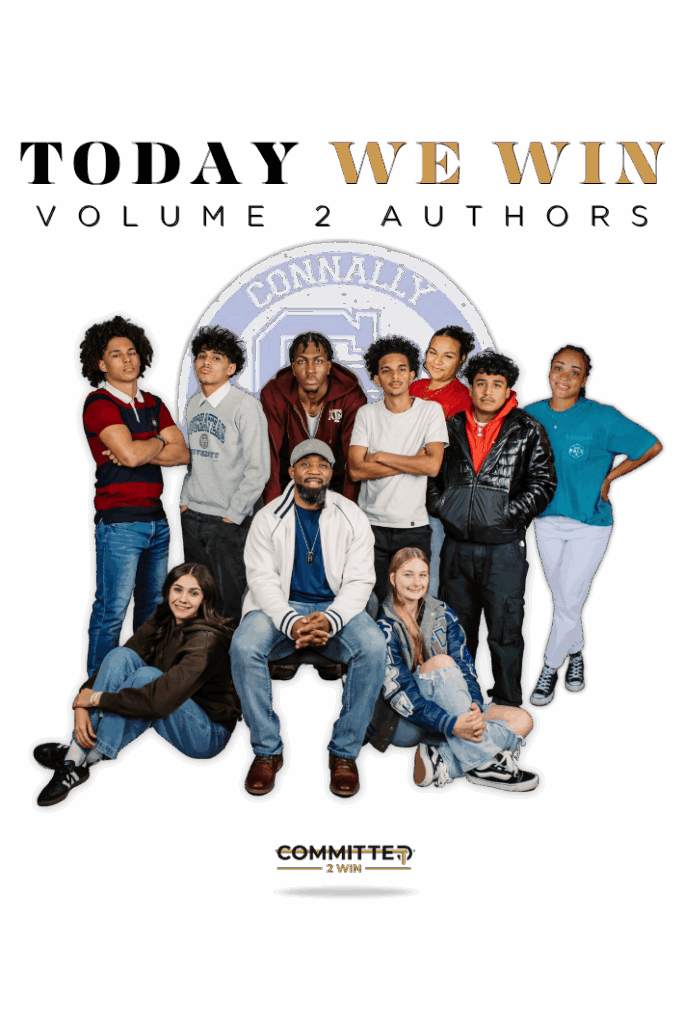
A Crisis in the Shadows
As graduation caps soar, a sobering reality grounds us: during the 2020–2021 academic year, over 60% of college students met the criteria for at least one mental health problem, according to the Healthy Minds Study, which collects data from 373 campuses nationwide (Lipson et al., 2022). This statistic underscores the urgent need to address mental health as students transition into adulthood.
The Power of Storytelling
At Connally High School in Waco, Texas, students confronted these challenges head-on through the Captains Circle Peer Leadership Program. Their experiences culminated in Today We Win: How Real Students Found the Answers to Life’s Tests (Volume 2), an anthology of personal narratives that delve into struggles with bullying, family dynamics, academic pressures, and self-doubt. This project not only provided a therapeutic outlet but also fostered a sense of community and resilience among the participants.
Celebrating Resilience
Special recognition goes to five remarkable students—Isaac, My’Toria, Caleigh, Bryson, and Alaina—who graduated last week. Their contributions to the book exemplify the courage and introspection needed to confront mental health challenges head-on. Their stories serve as beacons of hope for peers facing similar struggles.
Two Strategies for Supporting Student Mental Health
- Encourage Open Dialogue: Create safe spaces where students feel comfortable discussing their mental health without fear of judgment.
- Promote Access to Resources: Ensure that students are aware of and have access to mental health services, including counseling and support groups.
An Invitation to Empower
As we celebrate Mental Health Awareness Month and the achievements of the Class of 2025, we invite schools and communities to partner with Committed 2 Win. Together, we can create safe spaces, establish support groups, and promote sustained student success for the 2025–26 school year.
References
Lipson, S. K., Lattie, E. G., & Eisenberg, D. (2022). Trends in college student mental health and help-seeking by race/ethnicity: Findings from the national Healthy Minds Study, 2013–2021. Journal of Affective Disorders, 306, 138–147.

Darryl W. Thomas, Jr. is a U.S. Marine, leadership development expert, award-winning speaker, five-time bestselling author, and at-risk interventionist with over two decades of experience. He is the CEO of Committed 2 Win, a personal and leadership development community focused on inspiring, challenging, and empowering young people and adults to overcome adversity and take ownership in becoming the best version of themselves.Beyond his professional achievements, Darryl is a devoted family man, married to his high school sweetheart for 24 years and father to five children: a U.S. Marine, a TCU graduate, a University High School graduate, and two University High scholar-athletes.Let’s continue this conversation and ensure that every student knows they are not alone on their journey.Follow Darryl at LinkedIn, X and YouTube.
What is OCD?
The National Institute of Mental Health defines Obsessive Compulsive Disorder as a long lasting disorder in which a person experiences uncontrollable and recurring thoughts, engages in repetitive behaviors, or both. These repetitive thoughts, known as obsessions, can take the form of unwanted, disturbing thoughts called intrusions. Compulsions are typically referred to as a symptom of obsessions. These actions and behaviors are the mind and body attempting to protect itself, alleviating stress by complying with the thought or avoiding it altogether. Obsessive Compulsive Disorder has been labeled as one of the leading debilitating disorders by the World Health Organization, with 30% of those diagnosed abusing substances, yet it is highly misunderstood and misrepresented in standard media.
Why does awareness matter?
During OCD awareness week, which takes place the second week of October every year, the focus is on sharing information, personal stories, and resources to help those affected by the disorder. Many misconceptions exist about OCD, and understanding the true nature of the disorder can help reduce stigma and cultivate empathy. By continuing discourse and raising awareness, we can encourage those struggling with OCD to seek help by letting them know they are not alone.
Obsessive Compulsive Disorder is highly complex and only affects around 1-2 percent of the population, yet it is a treatable, tamable disease. Obsessions and compulsions can cause dysfunction and fear in all areas of one’s life, with physical, mental, social, spiritual, and moral status under attack. This impacts the way an individual suffering from OCD understands their own identity. OCD is not simply being tidy or washing your hands frequently, and this watered down rhetoric invalidates the experiences of those suffering from this ailment.
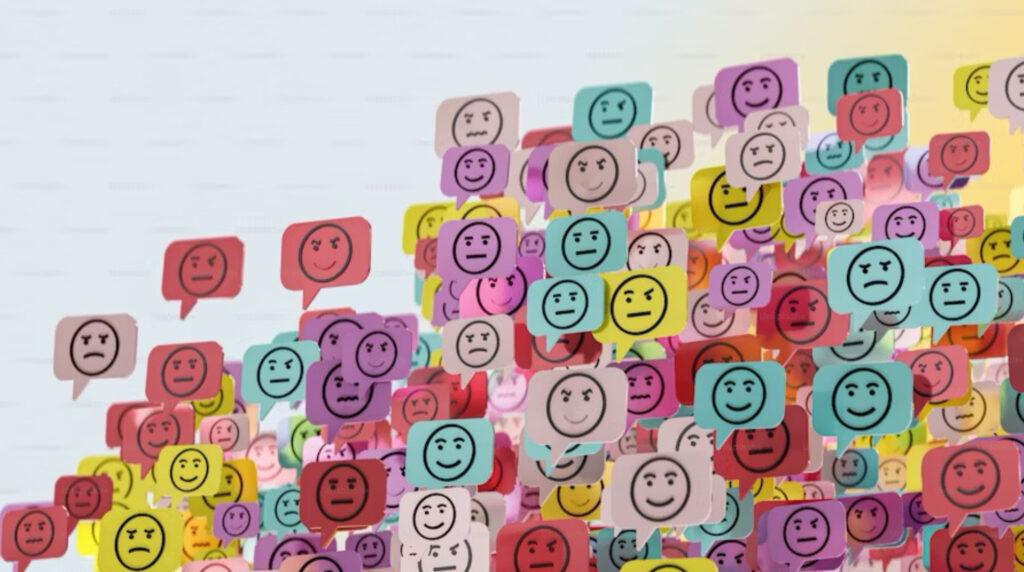
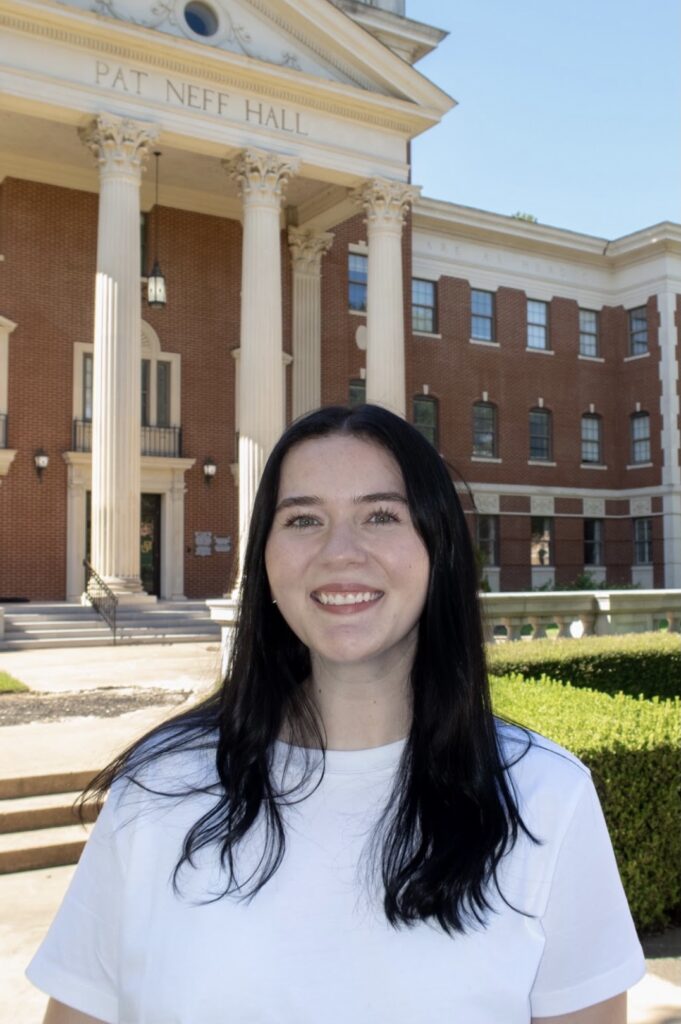
Elizabeth Riley hails from Tennessee and is a senior double majoring in English and Professional Writing & Rhetoric at Baylor University. She works as a Transcription Assistant at the Baylor University Institute for Oral History and is President of the Baylor Ice Girls for the 2024-2025 season.
Written by: Robin Layton
As Americans regroup after two years of a pandemic lifestyle, studies are revealing that youth who are in the sexual and gender minority are experiencing depression and anxiety at a faster rate than other groups.
In fact, The Trevor Project 2022 National Survey on LGBTQ Youth Mental Health found that “45% of LGBTQ youth seriously considered attempting suicide in the past year,” with 60% of the youth who wanted mental health care in the past year unable to access it. The survey also found that 73% of LGBTQ youth reported having symptoms of anxiety.
Being an LGBTQ young person, unfortunately, means that during their critical adolescent years, they can often feel isolated and misunderstood, lacking the resources they need to maintain their mental health.
With pandemic-related measures in place across the country, youth are at an even greater risk of social isolation and depression. But online resources, including supportive and educational materials, can help them maintain mental and emotional health.
In a Catch-22, the internet can make this necessary information accessible, but only if you have access to the internet.
In this guide, Allconnect researchers take a look at available online resources, as well as address the digital divide and homeless issues within the LGBTQ youth community.
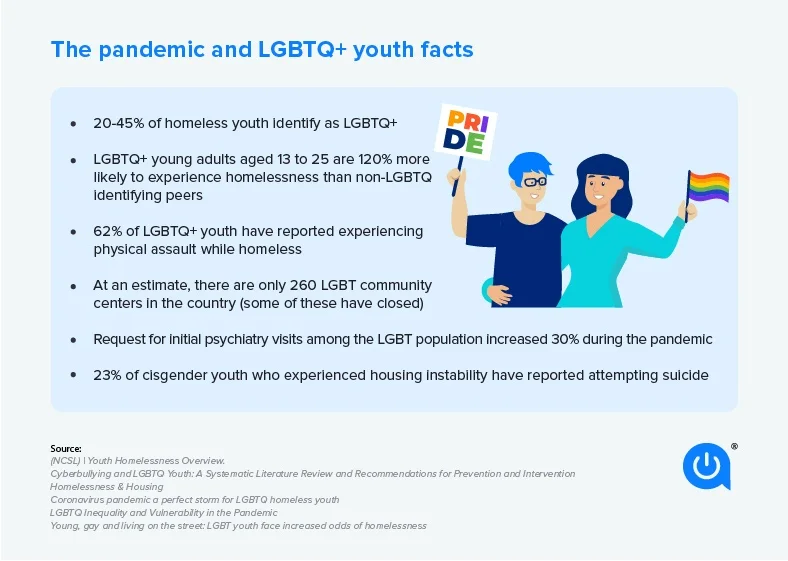
LGBTQ youth can face some unique challenges, such as higher rates of depression and suicide than their peers. A behavioral health report on youth.gov noted that suicide is the third leading cause of death among youth and young adults, and up to 33% of LGBTQ youth report having attempted suicide. LGBTQ high school students are also two to seven times more likely to commit suicide than their peers.
Along with all the pressures of growing into their own identities, they have increased risks of alcohol and drug use, bullying, peer pressure, depression, suicide attempts and high-risk sexual activities. LGBTQ youth and young adults may be kicked out of their homes, and often face homelessness.
Identifying as LGBTQ doesn’t cause depression or mental health issues. The cause is rooted within outside factors: Discrimination, family rejection, negative biases and bullying and hostile microaggressions that can lead to suicidal ideation, according to the report. When LGBTQ youth aren’t accepted for who they are, they have higher rates of stress, anxiety, depression, self-harm behaviors and other disturbances to mental health.
In addition, many LGBTQ youth are confronted with online bullying. Pre-pandemic, 32% of teens aged 14-17 spent about four hours in front of screens. As of June 2020, that number leaped to 62%, according to a Statista report.
Cyberbullying has made the internet a dangerous place for LGBTQ youth, and approximately 48.7% of LGBTQ students are victims of cyberbullying each year. This can be through private text messages or public posts on social media. Cyberbullying leads to high rates of psychological and emotional distress for LGBTQ+ youth, as well as low self-esteem, social isolation, depression and thoughts of suicide.
Other resource and advocacy groups
- The National Coalition of Anti-Violence Programs – The program offers direct services to survivors of all forms of violence and their circle of family and friends. They also work on policy and advocacy, and provide “free, holistic legal services to LGBTQ and HIV-affected survivors in all five boroughs of New York City in Family Court, Housing Court, Civil Court and with immigration matters.”
- GLAAD LGBTQ Resource List – GLAAD shares stories from the LGBTQ community and this list includes resources in politics, military, aging, legal and other sectors.
- The TrevorLifeline – Provides a national crisis intervention and suicide prevention lifeline for LGBTQ youth.
- Homelessness Help – Provides resources for homeless LGBTQ individuals in crisis, as well as provides a reporting platform for housing discrimination or violations.
- National Runaway Safeline – A hotline for youth who need someone to hear them, as well as for concerned adults.
- The LGBT National Youth Talkline – Free and confidential peer support for LGBTQ youth 25 and under.
- Trans Lifeline – Run by trans people, this lifeline provides peer support.
- National Suicide Prevention Lifeline – Free and confidential support for anyone in distress, suicide prevention and resources.
- TheRecoveryVillage.com – A free web resource that provides information about addiction, eating disorders and mental health issues.
- Drug Rehab USA – An accurate directory of LGBTQIA+ friendly drug and alcohol rehabilitation centers in the US
- Grow Resolve – Includes information like articles on substance use being more common in LGBTQ+ populations, ways to find local peer-led and queer-affirming support groups, guides to building a sober-supportive lifestyle, searches to finding insurance covering LGBTQ-affirming care, and tips on building sober-support networks
- Social Media Victims – An in-depth guide about the link between social media use and suicide as well as how you can assist a friend or child if you think they are suicidal.

